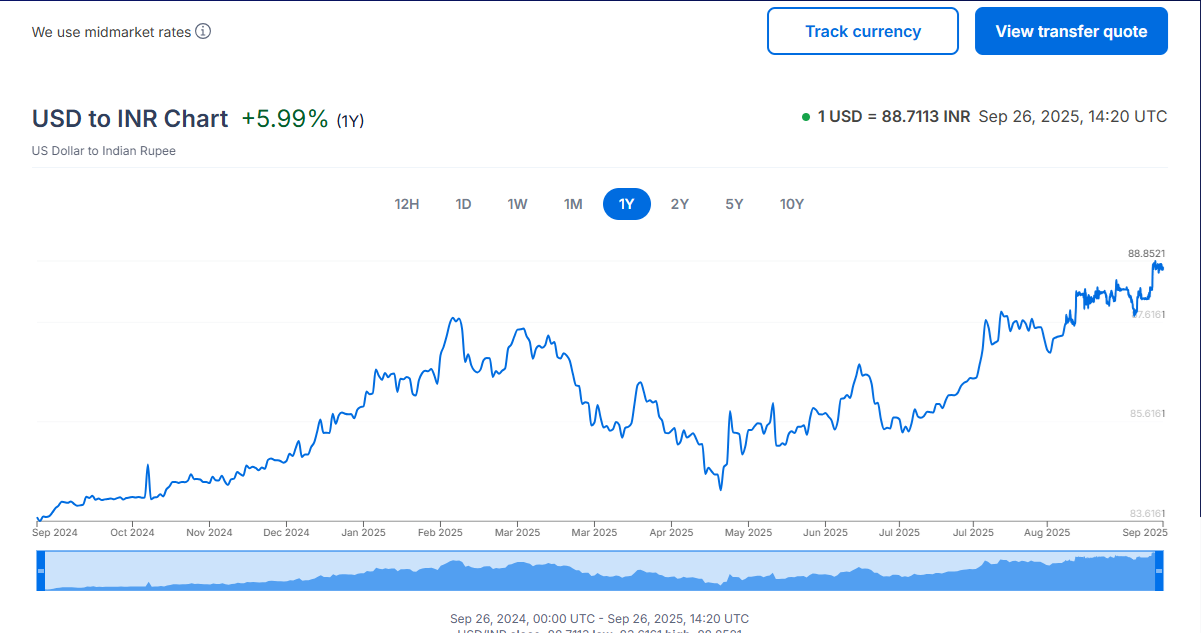⬛🔵 Editor’s Note — Forecast Check (Sep 2025)
In July 2024, this article projected a rupee decline during Jupiter’s transit in Gemini (May 2025–May/Jun 2026) based on historical cycles and India’s Taurus-Lagna linkages. That forecast has now played out. ✅
🟦🟩 What the market did
USD/INR pushed to fresh record/near-record lows ~₹88.8 in Sep 2025, despite intermittent RBI smoothing. See Bloomberg’s market wrap and Reuters’ intraday prints:
Bloomberg: “Rupee at new record low as visa-fee hike adds to tariff woes” (Sep 23, 2025) – https://www.bloomberg.com/news/articles/2025-09-23/rupee-at-new-record-low-as-us-visa-fee-hike-adds-to-tarrif-woes
Reuters (Sep 23–26):
• “Record low as U.S. tariff, visa policies heap pressure” – https://www.reuters.com/world/india/rupee-hits-record-low-us-tariff-visa-policies-heap-pressure-2025-09-23/
• “Heads to all-time low as visa-fee fallout persists” – https://www.reuters.com/world/india/rupee-heads-all-time-low-fallout-us-visa-fee-hike-persists-2025-09-24/
• “Averts fresh record on RBI intervention” – https://www.reuters.com/world/india/rupee-averts-record-low-cenbank-intervention-tariff-clouds-darken-2025-09-26/
Mint: “Rupee hits all-time low of 88.46” – https://www.livemint.com/market/stock-market-news/inr-vs-usd-rupee-hits-all-time-low-of-88-46-against-us-dollar-11758604322893.
🟥 Why it happened (finance)
Policy shocks from the U.S. — steep new tariff signals and a one-time $100,000 H-1B visa fee weighed on FX sentiment, services exports, and remittance expectations.
Reuters on fee impact (Sep 26, 2025): https://www.reuters.com/world/india/india-says-imposition-one-time-fee-h1b-visas-causes-disruptions-2025-09-26/
Reuters on fresh tariff salvo (Sep 26, 2025): https://www.reuters.com/world/india/rupees-rough-patch-may-extend-trump-fires-fresh-tariff-salvo-2025-09-26/
Bloomberg on remittances risk (Sep 22, 2025): https://www.bloomberg.com/news/articles/2025-09-22/trump-s-h-1b-fee-hike-poses-risk-to-india-s-remittances-rupee
Washington Post overview (Sep 24, 2025): https://www.washingtonpost.com/world/2025/09/24/india-h1b-visas-fee-skilled-workers/
Strong USD + positioning — broad dollar firmness, importer hedging, and periodic RBI tolerance for a controlled slide kept USD demand elevated.
Reuters day-of color: https://www.reuters.com/world/india/rupee-hits-record-low-tariff-jitters-central-bank-caps-decline-2025-09-05/
🟪 Why it matched the astrology
As outlined in the original piece, Jupiter’s transit through Gemini interacts with India’s national horoscope such that it historically coincides with pressure on the rupee (finance/2nd-house axis activation; Jupiter as functional malefic for Taurus Lagna). The May 2025–May/Jun 2026 window was flagged in 2024 as high-risk for INR weakness vs USD—which the market has confirmed.
◼️ “USD/INR trend, Sep 2024–Sep 2025. showing the climb toward ₹88.8

Source: XE (captured Sep 26, 2025). Rupee weakens to record/near-record area amid tariff & visa-fee headlines.
🟩 What to watch next
Any escalation/de-escalation in tariffs and visa-fee policy
RBI intervention pace vs tolerance for gradual depreciation
Oil & USD trend into year-end; importer hedging behavior
Introduction
In Vedic astrology, planetary transits can significantly impact a countrys economic conditions. Indias horoscope, with Taurus as its ascendant (lagna), offers insight into these economic fluctuations. Specifically, when Jupiter transits Gemini, there is a noticeable pattern of the Indian Rupee (INR) depreciating against the US Dollar (USD). This trend can be attributed to Jupiter being the 8th and 11th lord, placed in the 6th house, which makes it a functional malefic for Taurus ascendants. When Jupiter transits Gemini, it activates the 2nd house, where natal Mars (the 7th and 12th lord) is situated, leading to increased economic losses. Additionally, next year, India will move into its Mars Mahadasha from September onwards. From May to September 2025, it will be in Dasha Sandhi (Moon/Sun Dasha), which could further influence economic conditions.
Jupiters Transit Cycle in Vedic Astrology
As per Vedic astrology, Jupiter takes roughly 11.5-12 years to return to the same zodiac sign. This cyclical nature of Jupiters transit is crucial for understanding long-term economic trends. For instance, by examining past transits of Jupiter in Gemini, we can identify patterns and make predictions about future economic conditions. This knowledge is particularly useful for those involved in financial astrology and stock market astrology as it helps them anticipate market movements and make informed decisions.
Historical Patterns of Jupiters Transit in Gemini
Period |
Initial Exchange Rate (INR/USD) |
Final Exchange Rate (INR/USD) |
% Depreciation |
Reasons for Decline |
August 1965 - August 1966 |
4.76 |
7.50 |
57% |
Significant economic crisis culminating in the devaluation of the rupee on June 6, 1966, to address a balance of payments crisis and to boost export competitiveness. |
July 1977 - August 1978 |
8.62 |
8.74 |
1.4% |
The INR remained relatively stable due to consistent economic policies and effective management of foreign exchange reserves. |
July 1989 - July 1990 |
16.65 |
19.64 |
18% |
Economic challenges including inflation, fiscal deficit, and external debt, coupled with the impact of Jupiter transiting the 2nd house over natal Mars. |
June 2001 - July 2002 |
43.60 |
48.80 |
11.9% |
Rising oil prices, economic slowdown, and global uncertainties contributed to the depreciation, alongside Jupiters transit impacting the 2nd house of wealth and finances. |
May 2013 - June 2014 |
54.73 |
68.80 |
25.7% |
Large current account deficit, withdrawal of US monetary stimulus, and investor concerns over Indias economic growth during Jupiters transit in Gemini. |
Additional Astrological Factors
Mars as Gnati Karaka (GK) and its Placement in Ardra Nakshatra
In Jaimini astrology, Mars is considered the Gnati Karaka (GK), representing challenges, obstacles, and adversaries. Mars being in the 2nd house in Ardra Nakshatra adds to the intensity. Ardra Nakshatra, ruled by Rahu, is known for its fierce and transformative nature. It symbolizes storms and upheavals, indicating potential financial disruptions and losses.
Uranus in Mrigashira Nakshatra
Uranus, placed in Mrigashira Nakshatra in the 2nd house along with Mars, signifies sudden and unexpected changes. Mrigashira Nakshatra, ruled by Mars, represents exploration and searching, often leading to instability. The conjunction of Jupiter over Mars and Uranus during its transit can trigger sudden economic changes and volatility in the currency market.
Saturns Transit to Pisces
In Mar- April 2025, Saturn will move from the 10th house in Aquarius to the 11th house in Pisces. This transit will bring Saturns aspect to the 8th house. Within 2-3 months of Saturns move, Jupiter will also transit to Gemini, creating a double transit effect on the 8th house of Indias horoscope. The 8th house is associated with sudden events, transformations, and losses. The combined influence of Jupiter and Saturn on the 8th house indicates a high probability of significant economic changes, including potential depreciation of the INR.
Financial Astrology Predictions and Stock Market Astrology
Understanding the impact of Jupiters transit in Gemini can provide valuable financial astrology predictions. The historical data suggests that such transits often correlate with significant changes in the stock market. Investors might use financial astrology to anticipate these changes and adjust their trading strategies accordingly. This approach aligns with the principles of astrology trading, where planetary movements are analyzed to predict market trends.
How to Use Astrology in the Stock Market
Using astrology to predict the stock market involves studying planetary positions and their historical impacts on financial markets. For instance, the correlation between Jupiters transit in Gemini and the depreciation of the INR suggests that similar future transits could influence financial markets. Investors interested in how to use astrology in the stock market can explore this by monitoring upcoming planetary transits and their potential effects on market conditions.
Can Astrology Predict Stock Market Success?
While astrology provides insights into potential market trends, its essential to consider it as one of many tools. The historical patterns of Jupiters transit in Gemini impacting the INRs value indicate that astrology can offer valuable foresight. However, thorough research and a combination of astrological and economic analysis are necessary for accurate market predictions.
How to Learn Financial Astrology
For those interested in learning more about financial astrology, various resources are available. Books, courses, and financial astrology software can provide comprehensive knowledge on using astrological principles to predict economic trends. Understanding the basics of planetary transits and their historical impacts on financial markets is a good starting point for anyone looking to delve into this field.
Does Astrology Assist in Stock Market Predictions?
Astrology can assist in stock market predictions by offering an additional layer of analysis. The recurring pattern of INR depreciation during Jupiters transit in Gemini is a prime example of how astrological events can influence financial markets. While its not a standalone predictive tool, combining astrology with traditional market analysis can enhance the accuracy of financial forecasts.
Jupiters Transit Cycle in Vedic Astrology
As per Vedic astrology, Jupiter takes roughly 11.5-12 years to return to the same zodiac sign. This cyclical nature of Jupiters transit is crucial for understanding long-term economic trends. For instance, by examining past transits of Jupiter in Gemini, we can identify patterns and make predictions about future economic conditions. This knowledge is particularly useful for those involved in financial astrology and stock market astrology as it helps them anticipate market movements and make informed decisions.
Success in the Stock Market and Birth Chart Analysis
A significant factor in achieving success in the stock market is understanding ones birth chart. Astrological elements such as a strong moon and favorable placements in the 5th house can indicate potential for sudden gains in the share market. These insights can guide individuals in making informed financial decisions and improving their economic positions.
Cautionary Note on Astrological Forecasting
It is important to note that while there is a high probability of the INR depreciating during Jupiters transit in Gemini based on historical data, other astrological factors could also come into play. Our prediction might not always be accurate, and more research is required. As researchers from the DKSCORE research platform, we aim to scientifically correlate these astrological events with economic outcomes.
This article is a humble attempt to showcase the correlation between planetary transits and economic trends. With DKSCORE AI, the first research platform that allows Vedic research with data and facts, more comprehensive studies can be conducted to validate these findings.
Conclusion
The recurring pattern of INR depreciation during Jupiters transit in Gemini highlights the significant influence of astrological factors on economic conditions. Understanding these patterns can provide valuable insights for anticipating and preparing for future economic shifts. As Jupiter prepares to enter Gemini again, it is crucial to consider both astrological insights and economic strategies to safeguard Indias currency value.
References





















